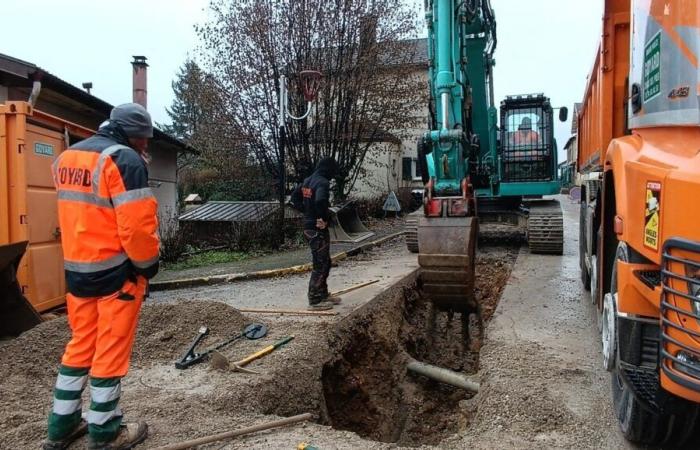Par
Julien Berrier
Published on
Dec 16 2024 at 4:15 p.m.
See my news
Follow Voix du Jura
Wednesday December 18the Grand Dole community council must, as every year, vote on the sanitation budget for the year 2025. A budget whose balances will be slightly modified compared to 2024 in response to the controversy over the inequity of prices highlighted by certain councilors community.
Injustices
In 2025, the municipalities of Dole, Tavaux and Damparis will be called upon to put more of their hands in their pockets while the bill for some small municipalities will be reduced. “ I am satisfied with the agreement that was reached. Our comments have been taken into account and we are returning to the rate level that was ours three years ago,” underlines Daniel Bernardin, mayor of Amange, and one of the most offensive community advisors on the issue.
Remember that in 2024, the budget vote gave rise to a controversial debate led by a few elected officials determined to denounce the “unfairness” of the prices imposed on certain municipalities. “ We have indeed been alerted to a certain inequity », recognizes Jean-Pascal Fichère, president of Grand Dole.
Heavy investments to finance
Since 2021, water and sanitation have been under intermunicipal jurisdiction, resulting in the need to arrive at a single rate for the entire territory. However, the sanitation situation is very different from one municipality to another with significant shortcomings in some municipalities.
All things considered, the Grand Dole defines a multi-year investment plan (PPI) in 2021 listing projects to be carried out for more than 50 million to invest over ten years dont 30 million for Tavaux et 5 million for Damparisnotably.
Conversely, some municipalities have sanitation equipment developed or operating using treatment systems that are less expensive than a traditional wastewater treatment plant (lagoons, rhizospheres).
When it came time to define a single price, the Grand Dole therefore had to call on solidarity to find a compromise to support the inevitable investments of the PPI without penalizing the inhabitants of municipalities with an efficient system.
From “convergence” to rising prices
A real headache of which the case of the municipalities of the former Vèze sanitation union (Siav) provides a good illustration. Integrated into Grand Dole in 2021, these municipalities had to comply with the trajectory of “price convergence” with price increases for residents. However, when it joined the Grand Dole, Siav seemed able to lower the price of m3.
In 2022, in my town, the sanitation bill will be increased by 20 euros for each of the families that make up our village. I thought it was mandatory, maybe, but I didn’t think we’d get a raise to begin with. Three years later, in 2024, we are being asked to increase the variable portion from 0.90 euros per m3 to 1.42 euros per m3, i.e. an increase of 52 cents, a 57% increase. We consider that for 120 m3, the average consumption of a household, multiplied by 50 cents, that makes 60 euros more per household, in our municipalities. In the space of three years, our residents will go from a management where prices should have fallen, here, to a sum of 90 euros. I find this unacceptable
While they denounced the price increases imposed on them, the same mayors pointed out the situations of municipalities in need of investment such as Tavaux and Damparis.
“This year, if you have looked, the sanitation of Damparis and that of Tavaux will begin to be undertaken. I look at their increase in the variable part, it is 41%; with us, it is 57%. I have trouble understanding why,” reported Daniel Bernardin in 2023.
In a word, some mayors had the strong impression that their residents were paying for others.
Three measures to correct the situation
When it comes time to vote on the 2025 tariffs, the Grand Dole has therefore gone back to work to find a less unfair balance.
The price was set in such a way that we achieve a necessary collection amount of 2.7 million euros, i.e. the operating income which allows us to generate enough self-financing to implement the investment plan.
And to announce above all that “the homogenization of sanitation prices” has been achieved with the probable consequence price stability for years to come .
In this context, three measures should make it possible to reduce the bill for certain municipalities.
The Grand Dole decided “ a 30% reduction» on the fixed part owed by the municipalities to those benefiting from less expensive treatment equipment (lagoons, rhizospheres). A decision which confirms the reduction decided in 2024 and responds to the strong demands of the municipalities concerned.
On the contrary, the variable part of Labor is increased by 30%while that of Damparis increases by 20% . Here again, the measure responds to the feeling of injustice expressed last year.
It must be recognized that these municipalities had the lowest amounts. That said, we must understand the technical difficulties encountered by these municipalities. The municipalities of the plain have a network which is submerged under the water table when there is significant rainfall. This imposes technical constraints and heavier investments
Finally, the City of Dole will put its hand in its pocket with a payment of 400 000 euros. Until then, the central city had been able to oblige itself to contribute since its water management is entirely regulated by a public service delegation (DSP) granted to Doléa. A single-operation mixed economy company (Semop) whose capital is held 51% by Suezand to49% by Grand Dole. In theory, nothing in this arrangement could move before the end of the contract in 2027.
An impasse denounced by several community advisors and which finally found a solution. “We thought we couldn’t do anything and, after study, it turned out that Grand Dole could request a levy from the City of Dole. According to our solidarity mechanism,Dole should pay 800,000 euros. AsDoléa pays dividends to Grand Dole for 400,000 euroswe set the levy for the City of Dole at 400,000,” explains Jean-Pascal Fichère.
Grand Dole Community Council: Wednesday December 18 at 6:30 p.m. at the Rochefort-sur-Nenon multi-activity room.
Follow all the news from your favorite cities and media by subscribing to Mon Actu.






